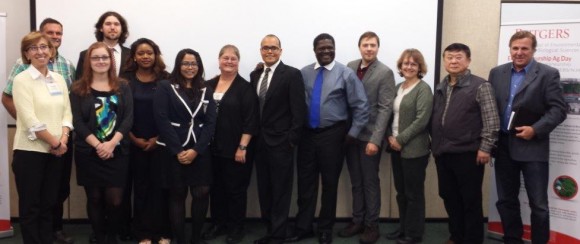
EA Day interns and faculty team members (l-r): Serpil Guran and Dave Specca from Rutgers EcoComplex; Roslyn Dvorin; Ian R. MacCloud; Tatiana Gladney; Kasturi Pryanka Shanker; Donna Schaffner, Rutgers Food Innovation Center – South; Sabedo Argueta; Albert Ayeni; Christopher Satch; Xenia Morin, SEBS Office of Grants Facilitation; Tung Ching Lee, Department of Food Science; and Bill Sciarappa
On October 18, Rutgers School of Environmental and Biological Sciences (SEBS) celebrated its second Entrepreneurship Agriculture (EA) Day on Cook Campus. This event was part of the Entrepreneurship Ag Program initiated at SEBS in Spring 2013 and comprised the teaching of a Jr/Sr Colloquium on Entrepreneurial Agriculture, a competitive student internship on Entrepreneurship Agriculture and the forming of a student club with the mission of promoting entrepreneurship in agriculture and food at SEBS. Forty-seven people were in attendance, including individuals from outside of Rutgers.
The key events included poster and oral presentations by EA interns Sabedo Argueta (Environmental and Business Economics 2014), Roslyn Dvorin (Ecology, Evolution & Natural Resources 2015), Tatiana Gladney (Agriculture and Food Systems 2016), Ian R. MacCloud (Plant Science 2015), Christopher Satch (Grad Student, Plant Pathology) and Kasturi Pryanka Shanker (Biotechnology 2014); and a keynote speech by Theresa Viggiano and Patrick Leger, founders and chief executives, First-Field, Inc.
Intern Sabedo Argueta (a returnee Intern) shared his internship experience at the New Brunswick Community Farmer’s Market near Cook Campus, in a lively presentation on his interaction with the New Brunswick community in greenhouse vegetable and specialty crop production activities. Among several ongoing entrepreneurial projects, Argueta highlighted the $45,000 Marigold project he jointly developed with Matthew Smith (EA Intern 2013), which targets the annual Mexican “Day of the Dead” festival in New Brunswick and surrounding cities in New Jersey. Marigold sales were carried out from October 25-31 — the “Day of the Dead” festival period.
Interns Roslyn Dvorin and Tatiana Gladney ,who paired for the 2014 internship, shared their dream entrepreneurship project on homestead chicken production – the “6-chick per family” initiative- to promote good nutrition among New Brunswick families. They showed the model chicken coop house they will be promoting for the chicken project and how through this project families’ health, especially for children and nursing mothers, will be enhanced by increasing protein intake from home raised eggs and chicken meat.
Intern Ian MacCloud interned at Rutgers Eco-Complex and shared with the audience what he learned about the computer technologies that support a functional Controlled Environment Agricultural (CEA) system. As an aspiring entrepreneur in CEA, Ian acquired the knowledge and skills he will need to establish his future CEA business in the United States.
Intern Christopher Satch, a graduate student of plant pathology, interned at Rutgers’ School of Environmental and Biological Sciences. He shared his research interests in commercializing Tiger nuts (Cyperus esculentus var. sativus) as an iron enriched tuber aimed at mitigating the problem of anemia in children and nursing mothers around the world. Satch brought samples of three types of Tiger nuts he is studying (labelled SK, MV and GH) to the EA Day venue for tasting by guests.
Intern Kasturi Pryanka Shanker interned at Rutgers Ag Research & Extension Center and the Food Innovation Center in Bridgeton, NJ. She shared her experience in producing the Malaysian tomato simmer sauce using the Jersey Fresh tomato combined with Malaysian ingredients. She presented a business plan that showed the viability of her project in New Jersey and the Mid-Atlantic where the targeted Asian population is increasing rapidly. Shanker brought samples of finished and bottled Malaysian simmer sauce branded “Mama Ruth’s Malaysian Kitchen”. She also brought some meat soup prepared with her tomato simmer sauce for tasting.
The keynote speakers Theresa Viggiano and Patrick Leger delivered an inspiring presentation on the growth of First-Field, Inc. as a tomato ketchup company in the past three years. The take home message in their presentation was that successful entrepreneurship is a combination of many virtues including well defined vision, determination to succeed, innovativeness, persistence, team work, good human relations and continuous learning. They encouraged students to think out of the box and come up with innovative methods of “doing more with less” as the human population approaches the 9 billion mark in less than four decades and the per capita global resources are shrinking.
Mark Robson, dean of agriculture and urban programs at SEBS and member of the SEBS E-Team, hosted the successful EA Day 2014 event. Bill Sciarappa, associate professor and agricultural agent for Rutgers Cooperative Extension of Monmouth County, and also a member of SEBS E-Team gave the vote of thanks. Albert Ayeni, coordinator of the EA Program and co-director for SEBS International Science and Education Program organized the EA Day event. The EA program is jointly funded by Rutgers SEBS and VentureWell (formerly NCIIA).


